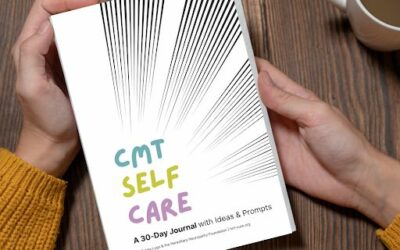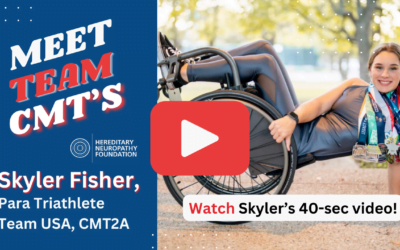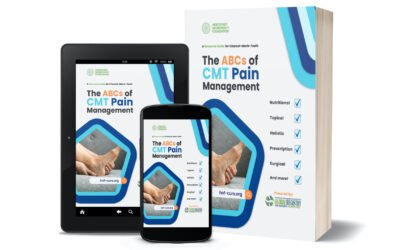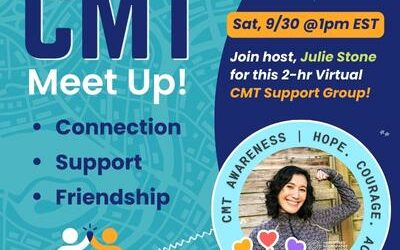Assistive Aids
There are a number of adaptive aids that can help make everyday tasks easier. This section lists just a few of them. Some of these items can be adapted from materials at home, others must be purchased. An occupational therapist may be helpful in identifying useful assistive aids.
Around the house
Everyday tasks around the house can become challenging. These aids may help:
- reacher/grabber – a long-handled pole with a claw or magnet at the end that helps grab items that are out of reach
- lever door/faucet handles can replace round doorknobs and faucet handles
- electric or battery appliances – such as can openers, salt and pepper grinders
- adaptive dishes – two-handled mugs and utensils with foam grips make eating and drinking easier
- power tools – choose power tools when available and large screw drivers for added torque
Diet
A healthy, balanced diet will help to keep the body in good condition and ready to deal with the challenges that everyday life with CMT may present.
- Eat a variety of foods to get the energy, protein, vitamins, minerals and fiber you need for good health.
- Choose a diet with plenty of grain products, vegetables, and fruits.
- Choose a diet low in fat, saturated fat, and cholesterol.
- Reduce your sugar intake.
- Reduce your salt and sodium intake.
- Drink alcoholic beverages in moderation
Employment
Quite often, discrimination and stigma stem from people’s lack of understanding of your medical condition. Generally, the more people understand about CMT, the easier it may be for you to get support if needed at your job. Consider having available CMTThe Basics fact sheet to help educate others. Also, keep in mind that what you tell people at work or at school is completely up to you.
You have job protection under the Americans with Disabilities Act (ADA). That means your employer may have to make reasonable accommodations so you can continue working. Learn more at http://www.ada.gov/
Getting About
Your doctor or physical therapist may suggest that you use orthotics or a mobility aid.
- Bracing/orthotics – There are a variety of opinions about the use of orthotics for people with CMT. What we have found is that it is a very individualized area. Be sure to discuss this issue with your own health care team. Often the only way to know if bracing will help is to try them out yourself.
- Canes – Consider the material, the handle shape, what they are made from, whether they fold or include a seat, etc.
- Walking poles – Designed for hikers and walkers, they have rubber stoppers and pack away easily.
- Walkers – Cut holes in tennis balls and slide them over the walker’s feet to make gliding over floors easier.
- Wheelchairs and mobility scooters – Consider how much you will use it, whether you will be using it independently, whether it folds, and comfort. Often these are needed for specific situations that involve a lot of walking/standing, such as travel.
Personal Care
Personal care tasks such as dressing, brushing hair, and brushing teeth can be frustrating if CMT is affecting your hands. Try these aids to make your morning easier:
- zipper and button puller looks like a hook with a handle
- long-handled shoe horns (about 18 inches) helps with putting on shoes
- sock and stocking aid helps you to put on socks and stockings
- adaptive handles make handles of toothbrushes and brushes bigger by using foam or tape or use Velcro strips to attach the handle to your hand when you are using it.
Physical Activity
It is recommended that you incorporate some type of physical activity into your daily routine, but be sure to talk with a physical therapist to develop an exercise plan that meets your particular needs. Get more tips on exercise and living with CMT.
Aerobic conditioning
Walking, biking (on road or spinning), repetitive movement to music, or swim- ming can strengthen your heart and lungs.
Strength training
Using light weights at home or at a gym, with professional guidance from a trainer who understands CMT or a physical therapist, may help maintain muscle tone. Yoga is also good for strengthening muscles and can be adapted to suit your needs.
Stretching
Daily stretching counters the shortening and tightening of muscles that CMT brings. Simple stretches can be performed just about anywhere, even from a chair or bed. Talk with your physical therapist to develop a stretching routine that is tailored to you.
Your Mental Health
Living with any chronic illness can be difficult. It is very normal to feel angry, depressed or discouraged at times, or to have those CMT days. Monitor your emotions so that you can access support if needed. Suggestions include:
- Establish a support team: personal and family connections, spiritual resources, professional counselors.
- Try to engage in some daily physical activity.
- Engage in activities for the mind, like classes, artwork, travel, or community work.
- Reduce stress by getting enough rest and practicing relaxation techniques.
- Genetic test. A blood test may tell whether you have CMT, although it may not provide all the answers.
- Connect with others in support groups to talk about your feelings and ask questions.
- Be an advocate for yourself and ask questions.














0 Comments